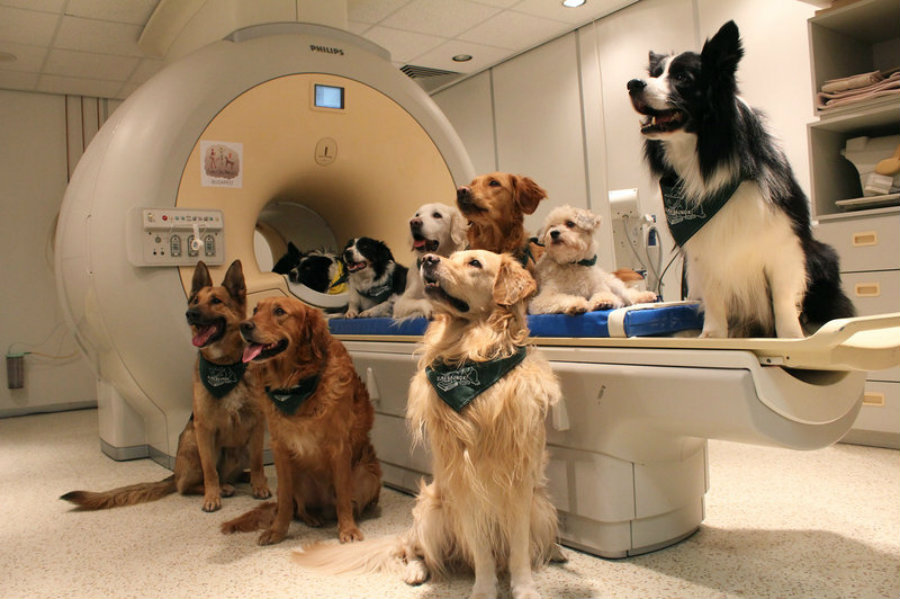A recent study held by scientists in Hungary has proven that dogs understand what humans say to them, regardless of intonation and use both hemispheres of their brain for the process.
Dogs are man’s best friends, keeping people company along their lifetime and proving to be loyal and devoted buddies. Which is why is not uncommon to see a dog-owner speaking in a baby voice to their furry friend or explaining a situation to his pet.

For decades, we humans have believed that our dogs reacted to the intonation of the words we spoke to them, rather than thinking dogs understood the words coming out of our mouths. The recent research published in the journal Science has proven all of us wrong.
Scientists from Hungary have confirmed dogs understand us, they really know us. That means that all of the times you tricked them to get a bath by speaking in a cute voice he actually knew what you were saying.
Studying dog’s understanding
Dogs have been in man’s life for thousands of years, but it wasn’t until the last decades that scientific studies focused on these furry species. The relationships and responses canines emit and react are directly related to their owner’s or loved ones, according to studies made by scientists Rooney and Bradshaw.
For example in 2002, the team performed a study to understand the effects of relationships between dogs and their owners at the moment of teaching and obeying, proving that after a good play session between the dog and the human, the canine reacted more obediently and was more attentive to orders like “stay.”

Playing with their owners also had a significant effect on the attachment the pet had with his human. In 2003 the science team found that games and physical contact with the dog had an influence on the pet’s attachment.
Recently a team of researchers decided to test how dogs reacted to different phrases and words depending on the tone, to understand how their brains analyzed human language.
The study was led by researcher Attila Andics from Hungary’s Eotvos Loránd University and consisted of analyzing the dog’s response to its owners’ words while scientists evaluated their brains through MRI scans.
Researchers gathered 13 family dogs from a variety of races and ages (mostly golden retrievers, border collies and one German shepherd from one to 12 years-old), a pet trainer was in charge of teaching dogs to lay still in the MRI machine for seven minutes. The dogs were never submitted or strained during the research.
Parallel to the pet’s training, researchers taped voice recording from the dogs’ owners speaking in a variety of tones and words to understand better how their brains reacted.
The recordings included neutral and positive voices that the owners often used with their pets, such as ¡Good boy! ¡Well Done! Among others. Meanwhile neutral words and conjunctions like “yet” and “if” were used in a positive tone to test if the dog reacted just to the intonation.
MRI scans showed that dogs actually used both side of their brains like humans to understand words and tone. The canines can process human language by using the left hemisphere and intonation doesn’t play a role in their understanding, the right hemisphere was used to understand tone.
The findings prove scientists that dogs use the same regions as people to understand and analyze language, by combining both hemispheres’ and match the words to meaning.
“The results were very exciting and very surprising,” said Attila Andics lead researcher of the study.
The study was able to prove wrong the long belief that dogs only react to the tone used in people’s voice, discovering that canines can put language and tone together and analyze it to provide meaning.
“It shows that for dogs, a nice praise can very well work as a reward, but it works best if both words and intonation match, so dogs not only tell apart what we say and how we say it, but they can also combine the two, for a correct interpretation of what those words really meant,” said lead researcher Andics in a statement to the Washington Post.
The study complements previous research were scientists analyzed how dogs reacted to their owners’ voice and treats. The study titled “Do dogs really love you for you or just because you feed them?” was guided by Gregory Berns from Emory University and proved dogs reacted better to their owner’s voice than to food.
The research made by Andics and his team also has an impact on the evolution of language and how animal’s brains work. The lead researcher explained that the previous idea that dog domestication 15.000 years ago led to their brain evolution is wrong.
It could actually mean that animals might have a very similar mind to ours and how we interpret language and words, as the Washington Post reports it, we might not be ” as unique as we think.”
Source: Christian Science Monitor
